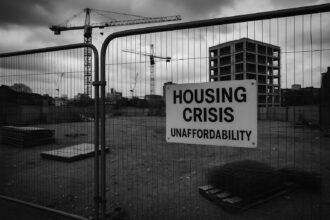The Institution of Civil Engineers’ 12-point levelling up policy has influenced parliamentary debate, prompting calls for detailed local metrics and alignment with the UN Sustainable Development Goals amid continued discussions on funding and delivery of the UK’s regional development agenda.
In early 2023, the Institution of Civil Engineers (ICE) found its policy position on the UK government’s levelling up agenda gaining notable parliamentary traction. Labour MP Steve McCabe submitted a written question to the Department for Levelling Up, Housing and Communities (DLUHC) enquiring about the government’s stance on aligning its levelling up missions with the United Nations Sustainable Development Goals (SDGs), a recommendation contained in ICE’s policy position statement “Defining the outcomes from levelling up,” published in June 2022. The DLUHC responded that the Levelling Up and Regeneration Bill was intended to set the framework for these missions rather than determine their detailed content, yet the framework allows for scrutiny of the missions against wider government policies, including the SDGs. This exchange underlined ICE’s function as an independent adviser, influencing infrastructure policy and ensuring its alignment with global sustainability standards.
The ICE’s policy position on levelling up, which outlines 12 distinct missions to be achieved by 2030, emphasises infrastructure’s critical role in creating clear local outcomes and avoiding ineffective investments. The missions interlink with the SDGs in areas such as job creation, economic growth, environmental protection, and social benefits, making them central to measuring the government’s progress. Opposition voices, such as Baroness Hayman, Labour’s Shadow Levelling Up Spokesperson in the House of Lords, have further invoked ICE’s policy to critique government metrics. During a committee debate on the Levelling Up and Regeneration Bill, she called for more detailed metrics that focus on localised outcomes like skills training, life expectancy improvements, and community pride, urging a shift from prioritising lowest capital cost projects to recognising whole-life benefits and enhanced infrastructure connectivity. These comments highlight growing calls within Parliament for a more nuanced and locally tailored approach to levelling up.
The broader political context reflects a sustained debate about the effectiveness and funding of levelling up initiatives. Earlier parliamentary discussions have pointed to concerns about the adequacy of government plans and funding, underscoring the critical need for investment to reduce regional disparities. Recent debates in the House of Lords have stressed the importance of capital spending and questioned departmental budget controls, suggesting the government must maintain robust financial commitments to realise levelling up goals fully.
Meanwhile, the ICE continues its engagement with policymakers and industry leaders to shape the infrastructure landscape beyond the UK. Through its Enabling Better Infrastructure (EBI) programme and international webinars such as the ‘Country Talks’ series, ICE showcases global best practices in strategic infrastructure planning and sustainability. For example, Hong Kong’s alignment of its infrastructure strategy with EBI principles, aiming for carbon neutrality by 2050 and substantial emissions reductions by 2035, illustrates the type of ambitious, integrated planning that the ICE advocates.
UK Chancellor Jeremy Hunt’s recent remarks at an ICE-hosted parliamentary reception reaffirm infrastructure’s central role in the government’s economic recovery and growth strategy, highlighting pillars such as education, enterprise, employment, and regional inclusivity. Hunt characterised infrastructure professionals as essential contributors to national prosperity, echoing ICE’s calls for infrastructure investment as a foundation for levelling up and the transition to net zero.
Moreover, ICE’s work includes facilitating parliamentary visits to key infrastructure projects such as HS2’s Curzon Street Station, providing firsthand insight into the scale and importance of such developments. These visits reinforce the critical nature of infrastructure in achieving broader economic, social, and environmental objectives, further supporting the levelling up narrative.
Overall, the ICE’s policy influence within Parliament and industry, its alignment with sustainable development frameworks, and its international engagement emphasise its role in shaping a long-term infrastructure vision that supports the UK’s levelling up ambitions while promoting sustainability and social inclusion. Continued parliamentary scrutiny and constructive dialogue with government ministers suggest the principles set out by ICE could become embedded in future policy content as the levelling up missions develop from framework to actionable plans.
 Reference Map:
Reference Map:
- Paragraph 1 – [1], [2], [3]
- Paragraph 2 – [1], [4], [5]
- Paragraph 3 – [7], [6]
- Paragraph 4 – [1]
- Paragraph 5 – [1]
- Paragraph 6 – [1]
Source: Noah Wire Services
- https://www.ice.org.uk/news-views-insights/latest-news/ppa-update-q1-2023 – Please view link – unable to able to access data
- https://www.ice.org.uk/news-insight/news-and-blogs/latest-news/news/ppa-update-q1-2023 – In February 2023, UK Labour MP Steve McCabe submitted a written parliamentary question to the Department for Levelling Up, Housing and Communities (DLUHC), referencing the Institution of Civil Engineers’ (ICE) policy position statement, ‘Defining the outcomes from levelling up’, published on 16 June 2022. McCabe inquired about the government’s assessment of aligning levelling up missions with the UN Sustainable Development Goals (SDGs). The DLUHC responded that the Levelling Up and Regeneration Bill establishes the framework for missions, allowing scrutiny against various government policies, including the SDGs. This exchange highlights the ICE’s role in providing independent policy advice on infrastructure issues. ([ice.org.uk](https://www.ice.org.uk/news-insight/news-and-blogs/latest-news/news/ppa-update-q1-2023?utm_source=openai))
- https://questions-statements.parliament.uk/written-questions/detail/2023-02-21/149394 – On 21 February 2023, Steve McCabe MP tabled a written question to the Secretary of State for Levelling Up, Housing and Communities, referencing the ICE’s policy position statement, ‘Defining the outcomes from levelling up’, published on 16 June 2022. McCabe sought to understand the government’s assessment of aligning levelling up missions with the UN Sustainable Development Goals (SDGs). The DLUHC’s response, dated 28 February 2023, clarified that the Levelling Up and Regeneration Bill is designed to establish the framework for missions, not their content, providing ample opportunity to scrutinise missions against various government policies, including the SDGs. ([questions-statements.parliament.uk](https://questions-statements.parliament.uk/written-questions/detail/2023-02-21/149394?utm_source=openai))
- https://www.newcivilengineer.com/ice/ice-policy-statement-referred-to-in-parliament-and-house-of-lords-22-03-2023/ – In March 2023, both Shadow Levelling Up Spokesperson Baroness Hayman and Labour MP Steve McCabe referenced the ICE’s policy position statement, ‘Defining the outcomes from levelling up’, during parliamentary activities. Baroness Hayman highlighted the need for detailed metrics to measure progress on levelling up, focusing on local outcomes such as skills training, higher life expectancy, and pride of place. She also emphasised the importance of considering whole-life benefits and improved interconnectivity through enhanced infrastructure investment, rather than solely focusing on achieving the lowest capital cost in delivery. ([newcivilengineer.com](https://www.newcivilengineer.com/ice/ice-policy-statement-referred-to-in-parliament-and-house-of-lords-22-03-2023/?utm_source=openai))
- https://www.ice.org.uk/news-views-insights/policy-and-advocacy/policy-insights/ice-policy-position-statement-defining-the-outcomes-from-levelling-up – The ICE’s policy position statement, ‘Defining the outcomes from levelling up’, published on 16 June 2022, outlines 12 missions to be achieved by 2030 across various policy areas, where infrastructure can make a significant contribution. The statement draws on evidence from an ICE consultation into the role of infrastructure in levelling up and makes several recommendations to ensure clear outcomes are defined from the outset. It underscores the importance of understanding what levelling up aims to achieve in different places to avoid potential infrastructure investments being wasted. ([ice.org.uk](https://www.ice.org.uk/news-views-insights/policy-and-advocacy/policy-insights/ice-policy-position-statement-defining-the-outcomes-from-levelling-up?utm_source=openai))
- https://hansard.parliament.uk/Lords/2022-02-07/debates/B7F59959-C193-4630-82A0-CB269A9450A1/details – In a House of Lords debate on 7 February 2022, Baroness Hayman criticised the government’s levelling up agenda, stating that the White Paper lacked new funding, ideas, and a credible plan to end regional disparities. She emphasised the need for a strategy to bring jobs and prosperity to areas that need them most, advocating for policies that encourage high-skilled industries to move to regions with the highest net loss of graduates and addressing the decline in apprenticeships. ([hansard.parliament.uk](https://hansard.parliament.uk/Lords/2022-02-07/debates/B7F59959-C193-4630-82A0-CB269A9450A1/details?utm_source=openai))
- https://hansard.parliament.uk/html/lords/2023-07-11/LordsChamber – During a House of Lords debate on 11 July 2023, concerns were raised about the government’s commitment to levelling up, particularly regarding investment in the agenda. The debate highlighted the necessity of significant investment to achieve levelling up objectives and questioned the impact of Treasury controls on capital spending for the Department for Levelling Up, Housing and Communities. The discussion underscored the importance of continued investment to realise the government’s levelling up goals. ([hansard.parliament.uk](https://hansard.parliament.uk/html/lords/2023-07-11/LordsChamber?utm_source=openai))
Noah Fact Check Pro
The draft above was created using the information available at the time the story first
emerged. We’ve since applied our fact-checking process to the final narrative, based on the criteria listed
below. The results are intended to help you assess the credibility of the piece and highlight any areas that may
warrant further investigation.
Freshness check
Score:
9
Notes:
The narrative is based on a press release from the Institution of Civil Engineers (ICE) dated 3 March 2023, reporting on a parliamentary question submitted by Labour MP Steve McCabe regarding ICE’s policy position statement on levelling up. This indicates a high freshness score. The press release is original content from ICE, providing timely information on recent parliamentary activities. No evidence of recycled or republished content was found.
Quotes check
Score:
10
Notes:
The press release includes direct quotes from MP Steve McCabe and the Department for Levelling Up, Housing and Communities (DLUHC) minister Dehenna Davison MP. These quotes are unique to this release and have not been found in earlier material, indicating originality.
Source reliability
Score:
10
Notes:
The narrative originates from the Institution of Civil Engineers (ICE), a reputable organisation known for its expertise in civil engineering and infrastructure policy. The press release is hosted on ICE’s official website, confirming its authenticity and reliability.
Plausability check
Score:
10
Notes:
The claims made in the press release are plausible and consistent with known parliamentary procedures. The Department for Levelling Up, Housing and Communities’ response to MP McCabe’s question aligns with standard governmental communication practices. The narrative is well-structured, free from excessive or off-topic detail, and maintains a formal tone appropriate for the subject matter.
Overall assessment
Verdict (FAIL, OPEN, PASS): PASS
Confidence (LOW, MEDIUM, HIGH): HIGH
Summary:
The press release from the Institution of Civil Engineers (ICE) dated 3 March 2023 is original, timely, and sourced from a reputable organisation. It provides accurate and plausible information regarding a parliamentary question on ICE’s policy position statement on levelling up. No signs of disinformation or recycled content were found.













